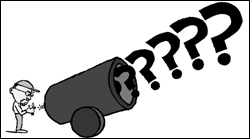I spent a fair amount of time last week watching and listening to the testimony before the independent commission investigating 9/11. I appreciated the directness with which panel members grilled current and former high-ranking officials of both the Clinton and Bush administrations. Sure, there was the usual partisan bickering, but you got a sense the panel might be something more when even partisans like former Republican Sen. Slade Gorton of Washington ran Donald Rumsfeld over the coals. (“What made you think . . . , given the history of Al Qaeda and its successful attacks on Americans, that we had the luxury of even seven months before we could make any kind of response, much less three years?” You go, Slade!)
But an awful lot of questions continue to go unasked, and not just the trivial ones, like where the dreadful new cliché “set your hair on fire” might have come from. Some of them are obvious enough that virtually anybody watching was asking them, too.
Let’s start with the most obvious. Why are we having these hearings now, and not two years ago? Why did it take so long to investigate 9/11, when the Bush administration was able to turn decades of American foreign policy and law enforcement precedent on their heads seemingly within days? We invaded Afghanistan, we passed the Patriot Act and a rash of executive orders undermining basic constitutional rights, we created a massive new federal “homeland security” bureaucracy, we spent a year trying to goad the world into helping us invade Iraq, and when that failed, we invaded anyway. We did all that—and in the process ran up a debt our great-grandkids will pay—but we were unable, before now, to take the time to investigate the incident that justified all of it? Why not? And why, even now, is the White House so hostile to the notion?
After the cataclysm that was 9/11, why did no heads roll? If not for any other reason, why not, for symbolic purposes, demonstrate that performance and results have consequences? Why were the heads of the CIA and FBI and National Security Advisor Condi Rice not fired on Sept. 12, 2001? I don’t subscribe to the notion that the Bushies knew, or should have known, that 9/11 was coming; Washington is awash in reports and chin-stroking papers that never get read, let alone acted upon. And conspiracy theories are overpriced at a dime a dozen. Bureaucracies have cracks large enough to drive a truck—or fly a commercial airplane—through. But once 9/11 happened, why was the immediate response a vast expansion of the powers and budgets of the very agencies that had just failed so spectacularly? Why was nobody held accountable?
Speaking of airplanes, how on earth, on 9/11, two full hours after all hell broke loose, could a hijacked jet come right into Washington, D.C., airspace and plow into the Pentagon? That’s an extremely high-value military target. Didn’t they have, like, any kind of defense for that? Missiles, fighter jets, anything? If they didn’t, why not? If they did and the system failed, why?
What has the Bush administration’s obsession with Iraq cost us in the War on Terror? I’m not just talking about former counterterrorism chief Richard Clarke’s testimony—which reiterated what former Treasury Secretary Paul O’Neill, former ambassador Joe Wilson, and others already told us—that Cabinet officials like Defense Secretary Rumsfeld, as well as Bush and Vice President Cheney themselves, were obsessed with Iraq, before and after 9/11. I mean, what did the invasion of Iraq do to strengthen Al Qaeda and kindred groups—as a recruiting tool, as a motivator, through the transformation of Iraq itself into a handy new terror target and training ground? How has the bogged-down war in Afghanistan, against a now-resurgent Taliban, suffered due to diversion of far greater resources to the war in Iraq? Has that diverted attention allowed bin Laden or other fundamentalists to reorganize and reassert themselves in ways that would not have been possible if Dubya had stayed on point?
That last question has become particularly important in the past two weeks, as Afghanistan’s election was postponed—a complete lack of safety in most of the country outside Kabul caused the United Nations to back down with only 10 percent of the country registered to vote—and in the context of the elections in Spain. The Spanish electorate threw out on its ear a government that lied to it, intentionally and systematically, about who was responsible for the Madrid terror bombings and why. Clarke, O’Neill, and others have essentially said that Bush did the same thing with 9/11, for more than two years, on far grander a scale, and with much graver consequences for the future security of our country.
Maybe that’s why they didn’t want this investigation.







